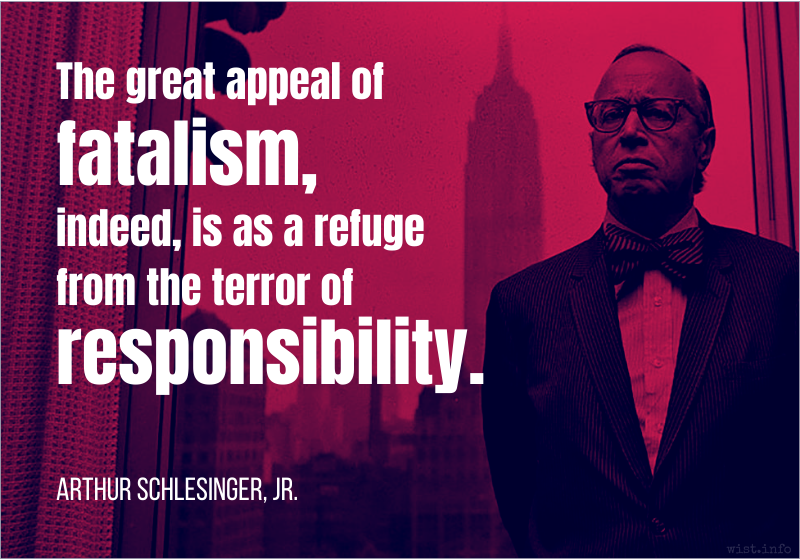Now, now, my sister, the Fates are in command.
Don’t hold me back. Where God and relentless
Fortune call us on, that’s the way we go![Iam iam fata, soror, superant; absiste morari;
quo deus et quo dura vocat Fortuna, sequamur.]Virgil (70-19 BC) Roman poet [b. Publius Vergilius Maro; also Vergil]
The Aeneid [Ænē̆is], Book 12, l. 676ff (12.676-677) [Turnus] (29-19 BC) [tr. Fagles (2006)]
(Source)
Declaring to his sister that, despite her attempts to protect him, Fate dictates he face Aeneas in (likely fatal) battle.
(Source (Latin)). Alternate translations:Fate calls now, sister, there is no delay:
What God and hard chance bids, we must obey.
[tr. Ogilby (1649)]Sister, the Fates have vanquish'd: let us go
The way which Heav'n and my hard fortune show.
[tr. Dryden (1697)]Sister, now, now, destiny prevails; forbear to stop me; let us follow whither god and rigid fortune calls.
[tr. Davidson/Buckley (1854)]The Fates, the Fates must have their way:
O sister! cease to breed delay:
Where Heaven and cruel Fortune call,
There let me follow to my fall.
[tr. Conington (1866)]Now, sister, now the fates prevail.
Bid me not pause. Wherever Heaven may lead
And Fortune stern, let us pursue our course.
[tr. Cranch (1872), l. 856ff]Now, O my sister, now fate prevails: cease to hinder; let us follow where deity and stern fortune call.
[tr. Mackail (1885)]Now, sister, now the Fates prevail! no more for tarrying try.
Nay, let us follow where the God, where hard Fate calleth me!
[tr. Morris (1900)]"Sister," he cries, "Fate conquers; let us go
The way which Heaven and cruel fortune show."
[tr. Taylor (1907), st. 88, l. 787ff]Fate is too strong, my sister! Seek no more
to stay the stroke. But let me hence pursue
that path where Heaven and cruel Fortune call.
[tr. Williams (1910)]Now, my sister, now Fate triumphs: cease to hinder; where God and cruel Fortune call, let us follow!
[tr. Fairclough (1918)]Fate is the winner now; keep out of my way,
My sister: now I follow god and fortune.
[tr. Humphries (1951)]The fates are too strong for me, sister -- I see it now. Don't hold me back;
Let me go where God and my own unmerciful fortune call me.
[tr. Day-Lewis (1952)]Sister, fate has won; do not
delay me; let us follow where both god
and cruel fortune call.
[tr. Mandelbaum (1971), l. 900ff]Ah, sister, see, fate overpowers us.
No holding back now. We must follow where
The god calls, or implacable Fortune calls.
[tr. Fitzgerald (1981), l. 915ff]"Sister," he said, "the time has come at last. The Fates are too strong. You must not delay them any longer. Let us go where God and cruel fortune call me."
[tr. West (1990)]Now, sister, now fate triumphs: no more delays:
where god and cruel fortune calls, let me follow.
[tr. Kline (2002)]Now, Sister, the Fates triumph at last.
Stop holding me back. We will follow
Where God and cruel Fortune call us.
[tr. Lombardo (2005)]Sister, fate has won. Stop delaying me.
Let's go where Jove and heartless Fortune call.
[tr. Bartsch (2021)]
Quotations about:
fatalism
Note not all quotations have been tagged, so Search may find additional quotes on this topic.
The great appeal of fatalism, indeed, is as a refuge from the terror of responsibility.
Arthur M. Schlesinger, Jr. (1917-2007) American historian, author, social critic
“The Decline of Greatness,” Saturday Evening Post (1 Nov 1958)
(Source)
The same phrase is used in the successor essay, "On Heroic Leadership," sec. 2. (1960)
The Moving Finger writes; and, having writ,
Moves on: nor all your Piety nor Wit
Shall lure it back to cancel half a Line,
Nor all your Tears wash out a Word of it.
Omar Khayyám (1048-1123) Persian poet, mathematician, philosopher, astronomer [عمر خیام]
Rubáiyát [رباعیات], Bod. # 31, etc. [tr. FitzGerald, 2nd Ed (1868), # 76]
(Source)
All Fitzgerald editions after the 2nd used the same text but numbered as # 71. The 1st Ed. was very similar, only using "thy" instead of "your," and numbered as # 51.
Fitzgerald seems to have merged at least three different fatalistic quatrains into this famous one of his: Bodleian #31, 54, and 95. Fitzgerald's use of a finger as the writing implement, rather the pen and pencils of other translators, seems taken from Daniel 5 in the Bible.
Alternate translations:
Bodleian # 31All things that be were long since marked upon the tablet of creation. Heaven's pencil has naught to do with good or evil. God set on fate its necessary seal; and all our efforts are but a vain striving.
[tr. McCarthy (1879), # 86] (1888)To me there is much comfort in the thought
That all our agonies can alter nought,
Our lives are written to their latest word,
We but repeat a lesson He hath taught.
[tr. Le Gallienne (1897), # 93]Whatever betides on the Tablet of Destiny writ is;
Of good and of evil thenceforward the Pen Divine quit is:
In Fate foreordained whatsoever behoveth It 'stablished:
Our stress and our strife and our thought-taking vain every whit is.
[tr. Payne (1898), # 191]From the beginning was written what shall be;
Unhaltingly the Pen writes, and is heedless of good and bad;
On the First Day He appointed everything that must be --
Our grief and our efforts are vain.
[tr. Heron-Allen (1898), # 31]Long, long ago, man's fate was graven clear,
The pen left nought unwrit of joy or woe;
Since from eternity God ruled it so
Then senseless are our grief and striving here.
[tr. Cadell (1899), # 11]Ere yet the dawn of Azal shed its light
O'er dreary chaos and the realms of night,
The Pen, unmoved by good and evil, wrote;
Nor grief can change, nor endless toil rewrite.
[tr. Roe (1906), # 21]Fate's marks upon the tablet still remain
As first, the Pen unmoved by bliss or bane;
In fate whate'er must be it did ordain,
To grieve or to resist is all in vain.
[tr. Thompson (1906), # 69]For He, to whom all future things are known,
E'en as He made thee wrote thy record down;
And what His pen hath written, good or ill,
No strife may alter, and no grief atone.
[tr. Talbot (1908), # 31]From of old the scheme of all that must be has existed.
The pen of destiny has written good and evil without ceasing.
He has appointed in predestination all that must come.
We distress and bestir ourselves, but all to no avail.
[tr. Christensen (1927), # 91]Before now there have been signs of what is to come,
The pen never rests from good or evil.
Destiny has given you all that is to be,
Our worries and our endeavours are in vain.
[tr. Rosen (1928), # 53]His tablet bears the future but concealed,
His pen is calm if good or bad we yield.
The powers gave us proper share at first,
With grief or strife no less nor more we wield.
[tr. Tirtha (1941), # 6.16]What we shall be is written, and we are so.
Heedless of God or Evil, pen, write on!
By the first day all futures were decided;
Which gives our griefs and pains irrelevancy.
[tr. Graves & Ali-Shah (1967), # 75]The characters of all creatures are on the Tablet,
The Pen always worn with writing "Good," "Bad":
Our grieving and striving are in vain,
Before time began all that was necessary was given.
[tr. Avery/Heath-Stubbs (1979), # 26]Signs of destiny have always been
Those hands inscribed both good and mean
What was written, came from the unseen
Though we tried without and worried within.
[tr. Shahriari (1998), # 24, literal]One is great
Who faces fate
Before it’s late,
Appreciate
The destined state
No matter how much we debate
Oppose, engage, or calculate
Even try to accelerate
Fate only moves at its own rate.
Futile is worry, anger and hate
Joy is the only worthy mate.
[tr. Shahriari (1998), # 24, figurative]
Bodleian # 54Yes, since whate'er the Pen of Fate has traced
For Tears of Man will never be erased,
Support thy Ills, do not bemoan thy Lot,
Let all of Fate's Decrees be bravely faced.
[tr. Garner (1887), 4.4]Whatever laws the pen of Fate has traced
For tears of man will never be erased;
Support thy ills, do not bemoan thy lot,
Let all of Fate's decrees be boldly faced.
[tr. Garner (1898), # 83]What the Pen has written never changes,
and grieving only results in deep affliction;
even though, all thy life, thou sufferest anguish,
not one drop becomes increased beyond what is.
[tr. Heron-Allen (1898), # 54]Nought can be changed of what was first decreed,
Grieve as thou wilt, no heart but thine will bleed;
If thy life long, thine eyes shed tears of blood,
'Twill not increase one drop woe's raging flood.
[tr. Cadell (1899), # 89]For what is written, be it long or brief,
Remains the same, nor tears can give relief;
No drop of destiny is less nor more,
Though naught you know but lifelong pain and grief.
[tr. Roe (1906), # 24]To change the written scroll there is no power.
And grieving only makes your heart bleed sore.
Though anguish all your life consume your blood.
You cannot add to it one drop the more.
[tr. Thompson (1906), # 73]Whate'er the Pen hath written stands for aye:
Afflictions's sword the grieving heart will slay;
Though all thy life with anguish thou art wrung,
The forward march of Fate thou canst not stay.
[tr. Talbot (1908), # 54]The Fate will not correct what once she writes,
And more than what is doled no grain alights;
Beware of bleeding heart with sordid cares,
For cares will cast thy heart in wretched plights.
tr. Tirtha (1941), # 6.12]
Bodleian # 95Oh my heart, since life's reality is illusion,
Why vex thyself with its sorrows and cares?
Commit thee to fate, contented with the hour,
For the pen, once passed, returns not back for thee!
[tr. Cowell (1858), # 15]Since life has, love! no true reality,
Why let its coil of cares a trouble be?
Yield thee to Fate, whatever of pain it bring:
The Pen will never unwrite its writ for thee!
[tr. M. K. (1888)]O heart! this world is but a fleeting show,
Why should its empty griefs distress thee so?
Bow down and bear thy fate, the eternal pen
Will not unwrite its roll for thee, I trow!
[tr. Whinfield (1883), # 257]O heart, my heart, since the very basis of all this world's gear is but a fable, why do you adventure in such an infinite abyss of sorrows? Trust thyself to fate, uphold the evil, for what the pencil has traced will not be effaced for you.
[tr. McCarthy (1879), # 159] (1888)Oh, heart! since in this world truth itself is hyperbole,
why art thou so disquieted with this trouble and abasement?
resign thy body to destiny, and adapt thyself to the times,
for, what the Pen has written, it will not rewrite for thy sake.
[tr. Heron-Allen (1898), # 95]O heart! 'tis true that all this world is vain,
Wherefore then eat the fruit of sorrow's tree?
To fate thy body yield, endure the pain;
The once split pen will never mend for thee.
[tr. Cadell (1899), # 100]O, Heart! Since earth's truth is illusion vain,
Why so distressed in lasting grief and pain?
Bear trouble ! Bow to Fate ! Once gone the Pen
For thee will never trace the scroll again!
[tr. Thompson (1906), # 300]O heart! truth absolute thou canst not see,
Then why abase theyself in misery?
Bow down to Fate, and wrestle not with Time!
The pen will not rewrite one word for thee.
[tr. Talbot (1908), # 95]Oh heart, as in truth the world is but a delusion,
Why grieve so much at this dearth of kindness?
Give thyself up to fate and befriend thy sorrow,
For this pen will not retrace its writing for thee.
[tr. Rosen (1928), # 170]O mind! the world is but a mocking sight,
You fancy some delights, and fret in fright;
Resign yourself to Him, and pine for Him,
You cannot alter what is black on white.
tr. Tirtha (1941), # 6.11]Oh heart, since the world's reality is illusion,
How long will you complain about this torment?
Resign your body to fate and put up with the pain,
Because what the Pen has written for you it will not unwrite.
[tr. Avery/Heath-Stubbs (1979), # 32]
Sister Mattie could be rather fatalistic at times; it was why she was such a good poisoning instructor. Death, felt Sister Mattie, must come to everyone in the end. Sometimes it simply required a little help.
The first rule is, to keep an untroubled spirit; for all things must bow to Nature’s law, and soon enough you must vanish into nothingness, like Hadrian and Augustus. The second is to look things in the face and know them for what they are, remembering that it is your duty to be a good man. Do without flinching what man’s nature demands; say what seems to you most just — though with courtesy, modesty, and sincerity.
[Τὸ πρῶτον μὴ ταράσσου: πάντα γὰρ κατὰ τὴν τοῦ ὅλου φύσιν καὶ ὀλίγου χρόνου οὐδεὶς οὐδαμοῦ ἔσῃ, ὥσπερ οὐδὲ Ἁδριανὸς οὐδὲ Αὔγουστος. ἔπειτα ἀτενίσας εἰς τὸ πρᾶγμα ἴδε αὐτὸ καὶ συμμνημονεύσας ὅτι ἀγαθόν σε ἄνθρωπον εἶναι δεῖ καὶ τί τοῦ ἀνθρώπου ἡ φύσις ἀπαιτεῖ, πρᾶξον τοῦτο ἀμεταστρεπτὶ καὶ εἰπέ, ὡς δικαιότατον φαίνεταί σοι: μόνον εὐμενῶς καὶ αἰδημόνως καὶ ἀνυποκρίτως.]
Marcus Aurelius (AD 121-180) Roman emperor (161-180), Stoic philosopher
Meditations, Book 8, #5 [tr. Staniforth (1964)]
(Source)
This translation was adapted (and significantly shortened) by Norman Vincent Peale in You Can If You Think You Can (1974): "The first rule is to keep an untroubled spirit. The second is to look things in the face and know them for what they are."
Peale's paraphrase significantly changes the meaning (by removing the fatalism and the sense of duty in the face of the actions of great men from the past, and turning it into a general call for calm and clarity). Nonetheless, Peale's version of this translation shows up all over the place, and generally without reference to him.
Original Greek. Alternate translations:First; let it not trouble thee. For all things both good and evil come to pass according to the nature and general condition of the universe, and within a very little while, all things will be at an end; no man will be remembered: as now of Africanus (for example) and Augustus it is already come to pass. Then secondly; fix thy mind upon the thing itself; look into it, and remembering thyself, that thou art bound nevertheless to be a good man, and what it is that thy nature requireth of thee as thou art a man, be not diverted from what thou art about, and speak that which seemeth unto thee most just: only speak it kindly, modestly, and without hypocrisy.
[tr. Casaubon (1634), #4]In the first place, keep yourself easy, for all things are governed by the laws and order of Providence: besides, you'll quickly go the way of all flesh, as Augustus, Adrian, and the rest of the emperors have done before you. Farther, examine the matter from top to bottom, and remember, that the top of your business is to be a good man: therefore whatever the dignity of human nature requires of you, set about it presently, without ifs, or ands: and speak always according to your conscience, but let it be done in the terms of good nature and civility.
[tr. Collier (1701)]This is the chief thing: Be not perturbed, for all things are according to the nature of the universal; and in a little time thou wilt be nobody and nowhere, like Hadrianus and Augustus. In the next place, having fixed thy eyes steadily on thy business, look at it, and at the same time remembering that it is thy duty to be a good man, and what man's nature demands, do that without turning aside; and speak as it seems to thee most just, only let it be with a good disposition and with modesty and without hypocrisy.
[tr. Long (1862)]In the first place, keep yourself easy, for all things are governed by the universal nature. Besides, you'll quickly go the way of all flesh, as Augustus and Hadrian have done before you. Farther, examine the matter from top to bottom, and remember that your business is to be a good man. Therefore, whatever the dignity of human nature requires of you, set about it at once, without "ifs" or "ands"; and speak always according to your conscience, but let it be done in the terms of good nature and modesty and sincerity.
[tr. Zimmern (1887)]In the first place, be not troubled; for all things are according to Universal Nature, and in a little while you will be no one and nowhere, even as Hadrian and Augustus are no more. Next, looking earnestly at the question, perceive its essence, and reminding yourself that your duty is to be a good man, and what it is that man's nature demands, do that without swerving, and speak the thing that appears to you to be most just, provided only that it is with kindness and modesty, and without hypocrisy
. [tr. Farquharson (1944)]The first step. Don't be anxious. Nature controls it all. And before long you'll be no one, nowhere -- like Hadrian, like Augustus. The second step: Concentrate on what you have to do. Fix your eyes on it. Remind yourself that your task is to be a good human being; remind yourself what nature demands of people. Then do it, without hesitation, and speak the truth as you see it. But with kindness. With humility. Without hypocrisy.
[tr. Hays (2003)]






